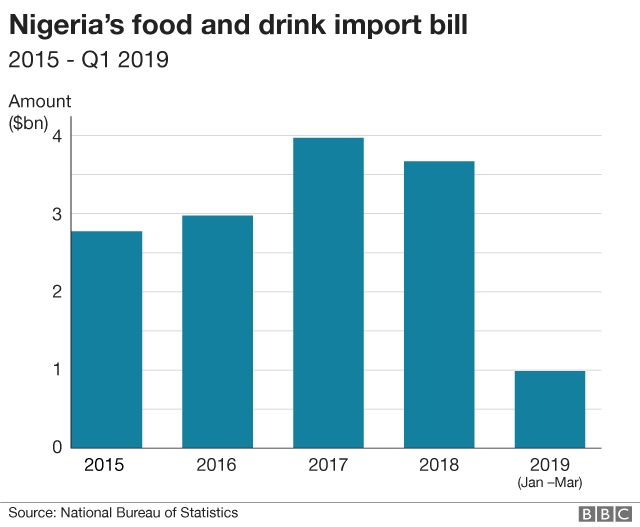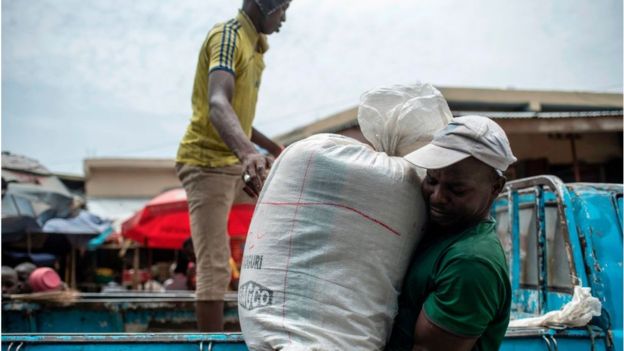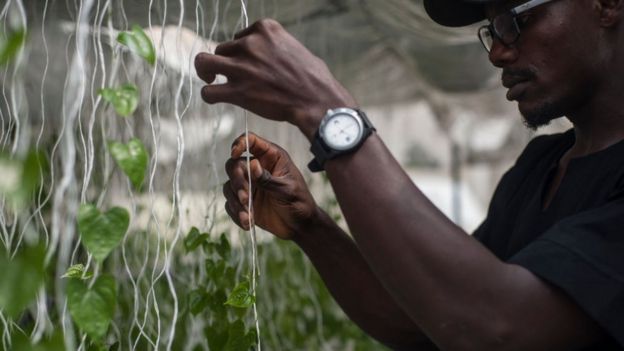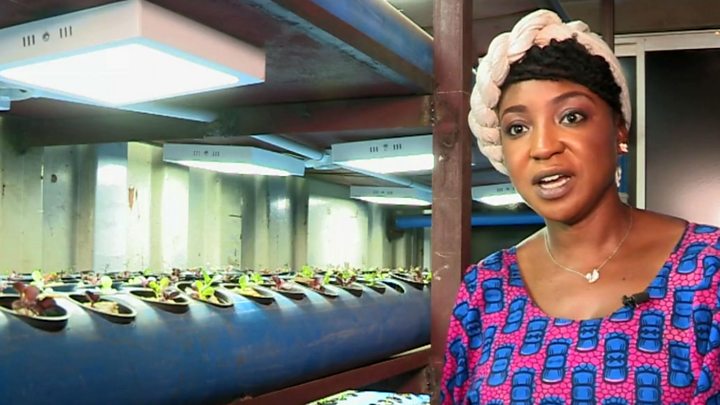Toàn chém vớ vẩn. Cho đọc tin tức gốc nhé: https://akahinews.org/border-closure-nigeria-rejects-vietnams-rice-importation-plea/
Bọn Nigeria gần đây hạn chế nhập khẩu lương thực, đây này:
https://www.bbc.com › news › world-africa-49367968
Thế nhé, chả hiểu bọn kia móc ra cái tin tức ở đâu. Có trách thì trách cán bộ của ông Huệ không tham mưu kỹ, hoặc phải chăng là cố tình chào hàng lương thực chăng?
Edit: Bổ sung thêm giải thích tiếng Việt.
Bài báo của Akahi News, nói rằng Nigeria không muốn nhập khẩu lương thực, họ thích VN đầu tư trồng lương thực trên đất của họ hơn. Cho rằng "Nếu Chính phủ (Nigeria) cho phép nhập lương thực, giới trẻ sẽ trở nên trì trệ (? idle dịch là trì trệ không biết đúng không?) và dẫn tới thất nghiệp. Nigeria muốn an ninh lương thực. Thay vì nhập từ VN, nông dân VN có thể sang Nigeria trồng trọt."Border Closure: Nigeria Rejects Vietnam’s Rice Importation Plea
The Federal Government (FG) has rejected plea by Vietnam that its rice should be allowed into Nigeria.
Instead, the FG asked Vietnamese investors to build rice processing mills in Nigeria, given the country’s large arable lands and potentials in rice farming.
Speaking at the Nigeria-Vietnam Trade and Investment Forum (NVTIF) in Abuja yesterday, the Permanent Secretary in the Ministry of Industry, Trade and Investment, Sunday Akpan, told the gathering that Vietnam was among the top five rice producers in the world.
Akpan said Nigeria would welcome collaboration with Vietnamese government and investors in the area of building rice processing mills in Nigeria given their vast experience in rice production.
The permanent secretary’s position appears to be a rejection of the appeal of the Vietnamese government that the Federal Government should allow it to export rice to Nigeria at discounted rates.
The Deputy Prime Minister of Vietnam, Vuong Dinh Hue, had on Tuesday made the appeal through the ruling APC when he led a five-man delegation to meet the Adams Oshiomshole-led National Working Committee (NWC) of the party.
The appeal may not be unconnected with the biting effect of Nigeria’s recent border closure and ban on rice importation through the land borders.
Rejecting the appeal, the APC Chairman, Oshiomhole, had told the visiting deputy prime minister that Nigeria would not accept such demand from Vietnam, advising the country to rather secure land and invest in rice production in Nigeria.
Oshiomhole said, “If government allows importation of food, our youths will become idle; that will lead to unemployment. We want to promote food security. Rather than importing rice from Vietnam, your (Vietnam) farmers can take advantage of our arable land. We have to do that not only to protect farmers, but to tackle food security,” he said.
The Abuja Chamber of Commerce and Industry (ACCI) President, Prince Adetokunbo Kayode, in 2017, said the trade volume between the countries was $303.83m, out of which Nigeria’s export to Vietnam was $232.65m and imports from Vietnam was $71.18m.
Kayode said Nigeria’s exports to Vietnam were mainly raw materials, especially cashew nuts, while imports were mainly mobile phones, electronics, textiles, plastics, chemicals and machinery parts.
He said, “Nigeria and Vietnam must devise more areas of economic cooperation in important sectors like oil and gas, maritime, mining, construction, power, agriculture, cement, transportation, engineering, telecommunication and education. This is in order to add maximal value to our economies on a win-win basis and to ensure mutual prosperity.”
Bọn Nigeria gần đây hạn chế nhập khẩu lương thực, đây này:
https://www.bbc.com › news › world-africa-49367968
Bài báo của BBC, thông báo rằng Nigeria đóng cửa biên giới, chặn nhập khẩu lương thực để tăng cường sản xuất trong nước.Why Nigeria has restricted food imports
President Muhammadu Buhari has directed the Central Bank of Nigeria to block food importers' requests for foreign currency in a bid to boost local agriculture in Africa's most populous country.
It is a continuation of a policy that the president began after coming to office in 2015, when he banned the use of foreign exchange to import dozens of items including the staple food, rice.
Since then, domestic rice production has increased, but the policy has been criticised for not taking the low capacity of local farmers into consideration. The policy has also coincided with a rise in food prices, which has been blamed on insecurity in some of the country's main food producing areas.
How much is Nigeria spending on importing food?
According to data from Nigeria's National Bureau of Statistics (NBS), the amount of money the country has been spending on importing food and drink increased from 2015 to 2017, dipped in 2018 and if the trend from the first quarter of this year continues, the bill will go up again for this year.
In 2015, Nigeria spent nearly $2.9bn (£2.4bn) and by 2017 that had risen to $4.1bn, the NBS says.

But the data picture is confusing as leading figures have quoted other figures.
Last December, central bank governor Godwin Emefiele said the annual food import bill was $1.9bn and had fallen from $7.9bn in 2015, the Punch newspaper reported.
But in September 2018, the agriculture minister at the time, Audu Ogbeh, said Nigeria spent $22bn importing food every year.
Which foods are imported?
Nigeria does produce the basic food commodities such as sugar, wheat flour, fish, milk, palm oil, pork, beef and poultry but up to now domestic farmers have not been able to satisfy demand of the country's 200 million people, hence the need for imports. With the foreign exchange ban Nigerian farmers will now have to increase production.
Official figures show that domestic rice production has gone up since 2015.
Image copyrightAFP
Image captionRice production has increased but farmers cannot meet all the demand
According to figures from the UN's Food and Agriculture Organization, rice production has increased from an annual average of 7.1 million tonnes between 2013 and 2017 to 8.9 million tonnes in 2018.
However, there are also reports that rice smuggling has increased - as customs officials continue to seize large quantities of the grain at the borders. This suggests that Nigerian rice farmers are still not producing enough.
Would restricting food imports boost local production?
Many experts believe that the policy of restricting food imports does have some merits, but the policy cannot be introduced in isolation.
Agricultural economist Idris Ayinde argues that restricting food imports should be a gradual process since the country cannot yet meet domestic demand for most food commodities, and the policy risks increasing food price inflation further.
Local rice production has increased, but the foreign exchange ban was coupled with policies aimed at supporting farmers through subsidies and loans.
For instance, last November, the government spent $165m subsidising rice production. Despite this, people continue to buy rice that has been smuggled into the country.
Image copyrightGETTY IMAGES
Image captionSome farmers are investing in innovative methods while others lack the capacity to boost capacity
Attempts to boost local production of palm oil have also been hit by smuggling. Foreign exchange to import palm oil was also restricted in 2015, but local producers have not been able to fill the gap.
The government now hopes that investing up to $500m in the industry can boost production from 600,000 tonnes a year to five million tonnes.
In addition to questions over local capacity, there is also a concern that the government's policy threatens the independence of the central bank. Former deputy governor of the bank Kingsley Moghalu said the president's directive contradicts the law, adding that the central bank's economic policy should not be "imposed by a political authority".
Could prices go up?
Economic theory suggests that reducing the supply of something will increase the price. There is a general belief therefore that if domestic supply cannot immediately replace what was once imported, Nigerians will end up paying more for their food.
Between 2015, when the foreign exchange restrictions for rice came into effect, and early 2017, the price of a 50kg bag of rice went from $24 to $82. It later fell in mid-2017 to $34.
But in June this year, the price stood at $49.
Why doesn't Nigeria produce more food?
The agricultural sector, which remains a major employer, has suffered years of neglect as Nigeria has spent decades relying on oil to provide much-needed foreign exchange and government revenue.

Media caption'We're farming in a shipping container', says Oluwayimika Angel Adelaja
There may be lots of people working on farms but a lack of investment has led to low productivity. In addition, not all available agricultural land is being used. It is estimated that just over a third of available land is being cultivated.
But following a big drop in the oil price five years ago, the country has renewed its interest in agriculture. If this enthusiasm can be converted into greater investment then the country should be able to produce more food.
Thế nhé, chả hiểu bọn kia móc ra cái tin tức ở đâu. Có trách thì trách cán bộ của ông Huệ không tham mưu kỹ, hoặc phải chăng là cố tình chào hàng lương thực chăng?
Edit: Bổ sung thêm giải thích tiếng Việt.
Chỉnh sửa cuối:





